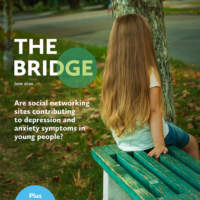Search results
-
Recommended
Sleep
Children and adolescents who are experiencing difficulties with their mental health also often struggle with their sleep. Indeed disrupted or altered sleep has been associated with most psychiatric disorders (Gregory & Sadeh, 2016). Although a range of sleep difficulties can co-occur with mental health problems, a common difficulty is insomnia. As such this guidance will primarily focus on difficulties with getting to sleep and staying asleep.
Read more -

ICD-10 versus ICD-11: the effects of PTSD diagnoses
2018 saw PTSD symptoms being changed by the International Classification of Diseases. Now, data from a study recently published in the Journal of Child Psychology and Psychiatry have shed light on the clinical utility of these revisions in the ICD-11.
Read more -

June 2020 – The Bridge
Includes ‘Are social networking sites contributing to depression and anxiety symptoms in young people?’
Read more -

Food Sensitivities and Proclivities – Episode 6 ‘Autism, a parents guide’ with Dr. Vicki Ford
Episode 6 with Dr. Vicki Ford looks at food sensitivities and proclivities, how to build a healthy relationship with food whilst understanding the challenges for many autistic children. Includes transcription, and links.
Read more -

In Conversation… Prof Argyris Stringaris
Professor Argyris Stringaris discusses his research and the NIMH (National Institute of Mental Health) with freelance Journalist Jo Carlowe. Includes transcription, and links.
Read more -

Some simple steps to using principles from Behavioural Activation to improve the mood of Children and Families who are at home and self-isolating
In this short article we are going to look at how an evidence based treatment for depression called Behavioural Activation (BA) could be helpful for families in lockdown.
Read more -

In Conversation… Dr Farhana Mann on Loneliness
Dr Farhana Mann gives a general overview of the landscape of loneliness and it impacts on children and young people. Includes transcription, and links.
Read more -

Accessing good communication – Deaf children in a mental health assessment
In order for a good mental health assessment to take place there has to be good communication between the two people in the interaction. Prof Barry Wright explains the implications for deaf children.
Read more -

In Conversation… Dr. Karen Treisman
Karen discusses areas of trauma and trauma enforcing models, parenting, adversity (ACE’s) and attachment, and using a range of creative therapeutic approaches with families. Includes transcription, and links.
Read more -

Digital interventions for young people: addressing the gap between development and implementation
Closing the gap between reliability and safety of mental health apps as an intervention.
Read more -

Innovation and Quality Improvement in Service Day conference – ‘Different Models of Mental Health Service Provision – Celebrations and Challenges’
This event has been postponed. Please see the above message.
- Event type
- Research Day
- Location
- Southampton
